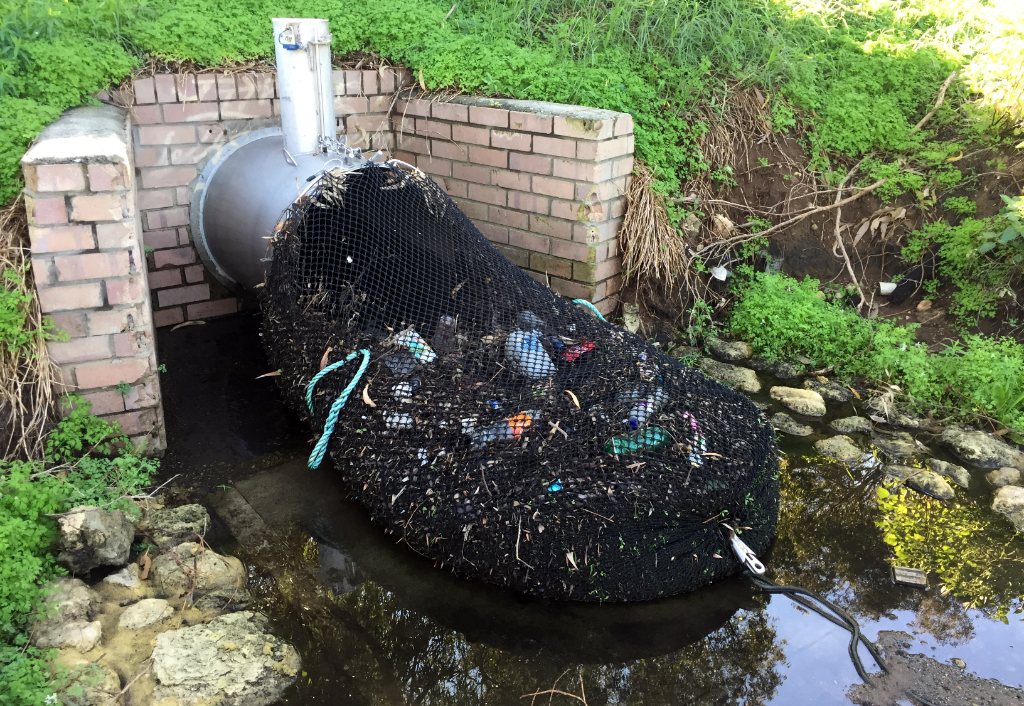Drainage nets draw global attention
By KARL WILSON | China Daily | Updated: 2019-06-14 09:39

Australian city of Kwinana keeps waste out of water with huge 'socks'
It has been described as the "simple pollution solution", a sock-like net that fits over a stormwater drain outlet to collect rubbish before it enters a waterway.
For years, the Australian city of Kwinana, just south of Perth in Western Australia, had been battling with waste such as plastic containers, bottles, paper and vegetation discharged into the city's waterways by stormwater drains.
It is a problem not unique to Kwinana, a city of 40,000 people. Cities around the world suffer from the same pollution problem.
Last year, the Kwinana council came up with a response and the results were "staggering", said a spokesperson for the council.
In March 2018, nets were fitted to the mouths of two local stormwater drains to trap litter and debris. Within three months, 370 kilograms of rubbish had been collected.
The result was so good and the council posted pictures of the nets on its social media page. Since then, the council's post has gathered more than 25 million hits.
"We have received inquiries from local government agencies and cities from around the world about the 'sock'," the spokesperson told China Daily.
The Ecosol Net Tech (drain sock) consists of a stainless-steel sleeve extension that is fitted into existing, or new, outlets, and a removable polyethylene net, which, when full of pollutants, disengages during rainfall, effectively eliminating the risk of flooding during peak-flow storms.
Easily installed into most drainage networks, the unit's simple design has a unique net release mechanism that eliminates any adverse effects when the bag fills during torrential downpours.
The drain sock is now a regular feature on stormwater drains around the city.
It is designed to catch solid pollutants such as plastic, paper and vegetation washed into stormwater drains from the road network before being discharged into the natural environment at the downstream end of the outlet area.
It has also been found to collect much smaller particles, including fine sediments.
"Of course, the nets don't capture liquid waste but by capturing solid waste we help protect and minimize the risk to wildlife," the spokesman said.
The two nets cost the city just under A$20,000 ($13,800), which included the cost of design, manufacture, installation and associated civil works for the two units. The represent considerable cost savings in labor-intensive work previously required to collect the rubbish scattered around the reserve by hand.
"This efficiency means the return on capital investment will be realized in the short term as well as cleaner reserves, higher efficiency and improved safety outcomes.
"The nets can be easily lifted and emptied into a truck with machinery. The waste is then transported to a sorting facility that processes the waste and converts the green waste to mulch and separates the recyclable/non-recyclable materials," the spokesperson said.
"The Ecosol Net Tech (drain sock) has been around for some time," said Sam Kowald, business development manager for South Australian-based Urban Asset Solutions and manufacturer of the product.
He said drain sock was developed in the early 1990s by a fisherman based in New South Wales before it was acquired by the company.
"Why all the interest now? I think the idea of the net gained traction after a European environmentalist wrote about Kwinana using the nets.
"I think that aroused a lot of international interest. We have been getting inquiries from all over the world. It has really been quite phenomenal," Kowald said.
The company said the net has been sold throughout Australia and Malaysia and enquiries have been received from countries including Turkey, Brazil and South Africa.
Kowald said the drain sock is a cost-effective and efficient pre-screening system for vegetated swales, wetlands, and on-site detention systems.
The unit is easily cleaned using a small crane truck for lifting the net and emptying the rubbish.
"During torrential down pours the bags can fill very quickly," Kowald said.
He said the bags have a life span from seven to 10 years.
"It is a simple device, cost effective and easy to use. It also has an enormous impact on pollution control. It is just such a simple device."
























